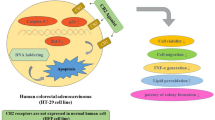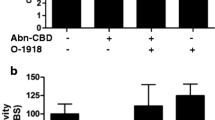Abstract
Cannabinoids have antiinflammatory and antitumorigenic properties. Some cannabinoids, such as O-1602, have no or only little affinity to classical cannabinoid receptors but exert cannabinoid-like antiinflammatory effects during experimental colitis. Here, we investigated whether O-1602 shows antitumorigenic effects in colon cancer cells and whether it could reduce tumorigenesis in the colon in vivo. The colon cancer cell lines HT-29 and SW480 were used to study the effect of O-1602 on viability and apoptosis. The effect of O-1602 on tumor growth in vivo was studied in a colitis-associated colon cancer mouse model. O-1602 decreased viability and induced apoptosis in colon cancer cells in a concentration-dependent manner (0.1–10 μM). In the mouse model, treatment with O-1602 (3 mg/kg, i.p., 12×) reduced tumor area by 50 % and tumor incidence by 30 %. Histological scoring revealed a significant decrease in tumor load. In tumor tissue, O-1602 decreased levels of proliferating cell nuclear antigen (PCNA), activation of oncogenic transcription factors STAT3 and NFκB p65, and expression of TNF-α while levels for proapoptotic markers, such as p53 and BAX, increased. The in vivo effects of O-1602 on PCNA, BAX, and p53 were also observed in colon cancer cells. The data provide a novel insight into antitumorigenic mechanisms of atypical cannabinoids. O-1602 exerts antitumorigenic effects by targeting colon cancer cells as well as proinflammatory pathways known to promote colitis-associated tumorigenesis. Due to its lack of central sedation, O-1602 could be an interesting compound for the treatment of colon and possibly other cancers.







Similar content being viewed by others
References
Ligresti A, Moriello AS, Starowicz K, Matias I, Pisanti S, De Petrocellis L, Laezza C, Portella G, Bifulco M, Di Marzo V (2006) Antitumor activity of plant cannabinoids with emphasis on the effect of cannabidiol on human breast carcinoma. J Pharmacol Exp Ther 318:1375–1387
Caffarel MM, Andradas C, Mira E, Pérez-Gómez E, Cerutti C, Moreno-Bueno G, Flores JM, García-Real I, Palacios J, Mañes S et al (2010) Cannabinoids reduce ErbB2-driven breast cancer progression through Akt inhibition. Mol Cancer 9:196
Wang D, Wang H, Ning W, Backlund MG, Dey SK, DuBois RN (2008) Loss of cannabinoid receptor 1 accelerates intestinal tumor growth. Cancer Res 68:6468–6476
Járai Z, Wagner JA, Varga K, Lake KD, Compton DR, Martin BR, Zimmer AM, Bonner TI, Buckley NE, Mezey E et al (1999) Cannabinoid-induced mesenteric vasodilation through an endothelial site distinct from CB1 or CB2 receptors. Proc Natl Acad Sci USA 96:14136–14141
Pertwee RG (2008) The diverse CB1 and CB2 receptor pharmacology of three plant cannabinoids: Δ9-tetrahydrocannabinol, cannabidiol and Δ9-tetrahydrocannabivarin. Br J Pharmacol 153:199–215
Cunha JM, Carlini EA, Pereira AE, Ramos OL, Pimentel C, Gagliardi R, Sanvito WL, Lander N, Mechoulam R (1980) Chronic administration of cannabidiol to healthy volunteers and epileptic patients. Pharmacology 21:175–185
Schicho R, Bashashati M, Bawa M, McHugh D, Saur D, Hu HM, Zimmer A, Lutz B, Mackie K, Bradshaw HB et al (2011) The atypical cannabinoid O-1602 protects against experimental colitis and inhibits neutrophil recruitment. Inflamm Bowel Dis 17:1651–1664
Díaz-Arteaga A, Vázquez MJ, Vazquez-Martínez R, Pulido MR, Suarez J, Velásquez DA, López M, Ross RA, De Fonseca FR, Bermudez-Silva FJ et al (2012) The atypical cannabinoid O-1602 stimulates food intake and adiposity in rats. Diabetes Obes Metab 14:234–243
Lin XH, Yuece B, Li YY, Feng YJ, Feng JY, Yu LY, Li K, Li YN, Storr M (2011) A novel CB receptor GPR55 and its ligands are involved in regulation of gut movement in rodents. Neurogastroenterol Motil 23:862–e342
Ligresti A, Bisogno T, Matias I, De Petrocellis L, Cascio MG, Cosenza V, D’Argenio G, Scaglione G, Bifulco M, Sorrentini I et al (2003) Possible endocannabinoid control of colorectal cancer growth. Gastroenterology 125:677–687
Cianchi F, Papucci L, Schiavone N, Lulli M, Magnelli L, Vinci MC, Messerini L, Manera C, Ronconi E, Romagnani P et al (2008) Cannabinoid receptor activation induces apoptosis through tumor necrosis factor alpha-mediated ceramide de novo synthesis in colon cancer cells. Clin Cancer Res 14:7691–7700
Sreevalsan S, Joseph S, Jutooru I, Chadalapaka G, Safe SH (2011) Induction of apoptosis by cannabinoids in prostate and colon cancer cells is phosphatase dependent. Anticancer Res 31:3799–3807
Huang L, Ramirez JC, Frampton GA, Golden LE, Quinn MA, Pae HY, Horvat D, Liang LJ, DeMorrow S (2011) Anandamide exerts its antiproliferative actions on cholangiocarcinoma by activation of the GPR55 receptor. Lab Invest 91:1007–1017
Aviello G, Romano B, Borrelli F, Capasso R, Gallo L, Piscitelli F, Di Marzo V, Izzo AA (2012) Chemopreventive effect of the non-psychotropic phytocannabinoid cannabidiol on experimental colon cancer. J Mol Med (Berl) 90:925–934
Ullman TA, Itzkowitz SH (2011) Intestinal inflammation and cancer. Gastroenterology 140:1807–1816
Itzkowitz SH, Yio X (2004) Inflammation and cancer IV. Colorectal cancer in inflammatory bowel disease: the role of inflammation. Am J Physiol Gastrointest Liver Physiol 287:G7–G17
Terzić J, Grivennikov S, Karin E, Karin M (2010) Inflammation and colon cancer. Gastroenterology 138:2101–2114
Brentnall TA, Crispin DA, Rabinovitch PS, Haggitt RC, Rubin CE, Stevens AC, Burmer GC (1994) Mutations in the p53 gene: an early marker of neoplastic progression in ulcerative colitis. Gastroenterology 107:369–378
Grivennikov SI, Karin M (2011) Inflammatory cytokines in cancer: tumour necrosis factor and interleukin 6 take the stage. Ann Rheum Dis 70:i104–i108
Grivennikov S, Karin E, Terzic J, Mucida D, Yu GY, Vallabhapurapu S, Scheller J, Rose-John S, Cheroutre H, Eckmann L et al (2009) IL-6 and Stat3 are required for survival of intestinal epithelial cells and development of colitis-associated cancer. Cancer Cell 15:103–113
Tanaka T, Kohno H, Suzuki R, Yamada Y, Sugie S, Mori H (2003) A novel inflammation-related mouse colon carcinogenesis model induced by azoxymethane and dextran sodium sulfate. Cancer Sci 94:965–973
Robertis MD, Massi E, Poeta ML, Carotti S, Morini S, Cecchetelli L, Signori E, Fazio VM (2011) The AOM/DSS murine model for the study of colon carcinogenesis: from pathways to diagnosis and therapy studies. J Carcinog 10:9
Sakai H, Yamada Y, Shimizu M, Saito K, Moriwaki H, Hara A (2010) Genetic ablation of TNF-α demonstrates no detectable suppressive effect on inflammation-related mouse colon tumorigenesis. Chem Biol Interact 184:423–430
Lavi I, Levinson D, Peri I, Nimri L, Hadar Y, Schwartz B (2010) Orally administered glucans from the edible mushroom Pleurotus pulmonarius reduce acute inflammation in dextran sulfate sodium-induced experimental colitis. Br J Nutr 103:393–402
Pfaffl MW (2001) A new mathematical model for relative quantification in real-time RT-PCR. Nucleic Acids Res 29:e45
Mathy C, Schneider K, Chen YY, Varma M, Terdiman JP, Mahadevan U (2003) Gross versus microscopic pancolitis and the occurrence of neoplasia in ulcerative colitis. Inflamm Bowel Dis 9:351–355
Ryberg E, Larsson N, Sjögren S, Hjorth S, Hermansson NO, Leonova J, Elebring T, Nilsson K, Drmota T, Greasley PJ (2007) The orphan receptor GPR55 is a novel cannabinoid receptor. Br J Pharmacol 152:1092–1101
Johns DG, Behm DJ, Walker DJ, Ao Z, Shapland EM, Daniels DA, Riddick M, Dowell S, Staton PC, Green P et al (2007) The novel endocannabinoid receptor GPR55 is activated by atypical cannabinoids but does not mediate their vasodilator effects. Br J Pharmacol 152:825–831
Ross RA (2011) L-α-lysophosphatidylinositol meets GPR55: a deadly relationship. Trends Pharmacol Sci 32:265–269
Liu W, Reinmuth N, Stoeltzing O, Parikh AA, Tellez C, Williams S, Jung YD, Fan F, Takeda A, Akagi M et al (2003) Cyclooxygenase-2 is up-regulated by interleukin-1 beta in human colorectal cancer cells via multiple signaling pathways. Cancer Res 63:3632–3636
Popivanova BK, Kitamura K, Wu Y, Kondo T, Kagaya T, Kaneko S, Oshima M, Fujii C, Mukaida N (2008) Blocking TNF-alpha in mice reduces colorectal carcinogenesis associated with chronic colitis. J Clin Invest 118:560–570
Bromberg JF, Wrzeszczynska MH, Devgan G, Zhao Y, Pestell RG, Albanese C, Darnell JE Jr (1999) Stat3 as an oncogene. Cell 98:295–303
Suzuki A, Hanada T, Mitsuyama K, Yoshida T, Kamizono S, Hoshino T, Kubo M, Yamashita A, Okabe M, Takeda K et al (2001) CIS3/SOCS3/SSI3 plays a negative regulatory role in STAT3 activation and intestinal inflammation. J Exp Med 193:471–481
Burmer GC, Rabinovitch PS, Haggitt RC, Crispin DA, Brentnall TA, Kolli VR, Stevens AC, Rubin CE (1992) Neoplastic progression in ulcerative colitis: histology, DNA content, and loss of a p53 allele. Gastroenterology 103:1602–1610
Chang WC, Coudry RA, Clapper ML, Zhang X, Williams KL, Spittle CS, Li T, Cooper HS (2007) Loss of p53 enhances the induction of colitis-associated neoplasia by dextran sulfate sodium. Carcinogenesis 28:2375–2381
Acknowledgments
We would like to thank Veronika Pommer for excellent technical assistance. This study was supported by grants from the Austrian Science Fund (P 22771 to RS, P22521 to AH, and P21004 to GM), the Austrian National Bank (OeNB 14429 to RS and 14263 to AH), the Franz Lanyar Foundation (351 to RS), and the Innovative Medicines Initiative Joint Undertaking (IMI) Grant (OncoTrack to JH). JK and AS are funded by the PhD program of the Medical University of Graz.
Diclosure
The authors declare no conflict of interest.
Author information
Authors and Affiliations
Corresponding author
Electronic supplementary material
Below is the link to the electronic supplementary material.
ESM 1
(PDF 244 kb)
Rights and permissions
About this article
Cite this article
Kargl, J., Haybaeck, J., Stančić, A. et al. O-1602, an atypical cannabinoid, inhibits tumor growth in colitis-associated colon cancer through multiple mechanisms. J Mol Med 91, 449–458 (2013). https://doi.org/10.1007/s00109-012-0957-1
Received:
Revised:
Accepted:
Published:
Issue Date:
DOI: https://doi.org/10.1007/s00109-012-0957-1




